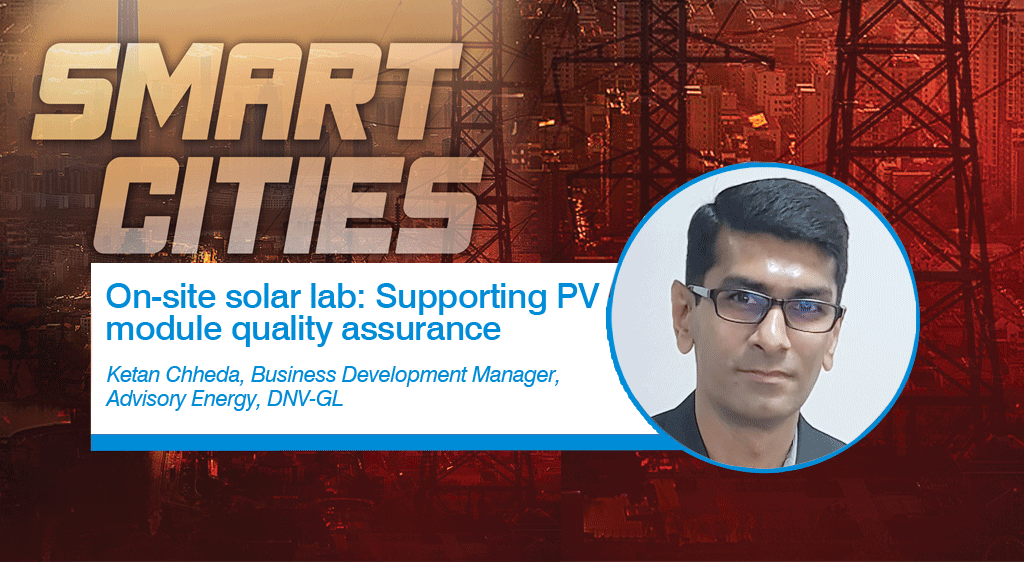On-site solar lab: Supporting PV module quality assurance
By EPR Magazine Editorial January 5, 2019 2:04 pm IST
By EPR Magazine Editorial January 5, 2019 2:04 pm IST

The value that we are able to provide developers will allow them to independently verify the power of the modules at site
Ketan Chheda, Business Development Manager, Advisory Energy, DNV-GL
Ketan Chheda, Business Development Manager for DNVGL’s Energy Advisory team in India in an interaction with Zaid Lakdawala of EPR talks about their new service, On-site Solar Lab, launched at Intersolar India 2018, which will help stakeholders implement field quality assurance strategies.
What were your expectations from Intersolar India 2018?
Intersolar 2018 was a great platform to launch our new service. Intersolar attracts a lot of relevant customers who come to such exhibitions where new technologies, new services and innovations are displayed; so, we were here for the same opportunity.
What products were launched at Intersolar India 2018?
At Intersolar 2018, we launched our On-site Solar Lab, new service wherein we will perform flash test (I-V curve measurements) and electroluminescence (EL) imaging on modules at site. With this new service, we will provide more value-added inputs to our customers.
Walk us through a bit more about DNV GL’s journey in India.
DNV GL have been serving Indian solar market since 2012, providing advisory and technical consulting services to our customers. We’ve been supporting financiers and developers by undertaking bankable energy assessments for their project financing needs. We also support mergers and acquisitions transactions by undertaking technical due diligence for investors. With the launch of our new service, we will provide valuable insights to our customers regarding the PV modules already installed or about to be installed.
How do you gauge the benefits that the On-site Solar Lab would provide to the Indian customers?
There are two aspects that we are focusing on; the first aspect is evaluation before the module installation. Very often, developers have their own quality assurance programs wherein they want to assess the quality of the modules that they have received. The case being that when modules arrive for the first time at a project site, there are very little inspections and investigations one can undertake to have a good amount of insight about the modules. Developers are investing in several ways to mitigate technical risks, such as deploying third party agencies at the module factory.However, once the modules leave the factory, there is a possibility of modules getting damaged during transportation. The value that we are able to provide developers will allow them to independently verify the power of the modules at site, identify if the modules have any transportation related damage, and help them with module delivery acceptance in the field. So, this is one aspect we cover when we talk about new projects.
How imperative do you think it is to do a solar energy assessment? What are the factors covered in the assessment?
Solar energy assessment is very critical as financial closures are dependent on it. Energy assessment is a process where you look atvarious factors such as the plant location, local irradiation and weather, type of modules and inverters, design being implemented in the plant and run simulations using industry standard software and apply certain loss factors.This enables one to estimate annual energy generation potential, which is used by the developers and lenders to finalise project financing. DNV GL has undertaken energy assessment for over 5,000 MW of solar projects in India till date.
Please tell us about your contribution towards the Indian wind sector?
We have been in the wind business much earlier in India. We’ve been providing technical consulting and advisory services to India’s wind industry since 1996. The services that we offer are wind resource and bank ability assessments, technical due diligence, technical reviews of wind turbines, WTG foundation designer views, measurement services, etc. Our primary business is basically to support the developers, the lenders, and the other stakeholders by undertaking technical due diligence and providing technical advisory and consulting services.
Do you think it is possible to build a society entirely on renewable energy?
I think it is possible. We have to add in elements of storage because renewable s, by nature, are variable and intermittent. So, by adding and complementing with storage, I think it is very much possible to have a society entirely dependent on renewable energy. In fact, there are some countries that are generating most of their energy from renewables.
What other scope of activities does DNV GL offer in terms of renewable energy to the Indian market?
We can offer our services to our customers through the entire life-cycle of the project, right from the feasibility to engineering & development, construction & commissioning, as well as operation. DNV GL is also a leading service provider for testing and certification needs. So, we have capabilities, tools, and expertise to provide services to our clients at any stage of the project life cycle.
We use cookies to personalize your experience. By continuing to visit this website you agree to our Terms & Conditions, Privacy Policy and Cookie Policy.